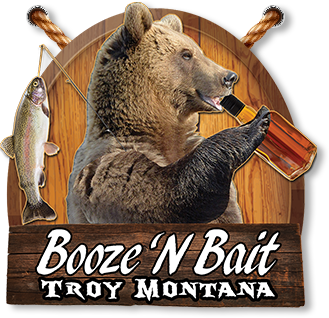
A bear on a back porch seeking food in a garbage bin. FWP file photo
Springtime bear activity increasing in northwest Montana
Remove or secure food attractants to help avoid a bear conflict
KALISPELL � Bears tipping over garbage cans. Bears climbing onto porches pursuing bird feeders. Bears in back yards.
Montana Fish, Wildlife & Parks staff in northwest Montana have started receiving familiar phone calls in springtime, when bears re-emerge from their winter dens and seek unsecured food attractants, such as bird feeders, residential garbage cans, small livestock, and more. Reports of bear sightings and minor conflicts have started occurring across the Flathead Valley.
�Bears become more active in April and May, and now is a good time for residents to assess their property and remove any unsecured food attractants,� said Justine Vallieres, FWP regional wildlife conflict specialist. �The best way to avoid having a bear on your property is to secure or remove attractants.�
FWP staff in the Flathead Valley will be presenting on bear safety and management at a few upcoming events.
On April 5, Whitefish Legacy Partners is hosting a �Bear Aware� presentation at 6:30 p.m. at Alpine Theatre Project Studios, 6475 Highway 93 South, in Whitefish.�To register for this free event, visit https://www.whitefishlegacy.org.
Also on April 5, Swan Valley Connections is hosting a �Spring Bear Wake-up Social Community Potluck and Presentation� with FWP staff who will share updates on bears in the area. The event starts at 5:30 p.m. at the Swan Valley Community Hall. The event will be livestreamed online, and more information is available at https://www.swanvalleyconnections.org/.
Whitefish Legacy Partners is hosting a second event in Kalispell on April 20 at 6:30 p.m. at Bias Brewing, 412 South Main Street. To register for this free event, visit https://www.whitefishlegacy.org.
FWP reminds residents and recreationists that Montana is �Bear Country� with populations of grizzly bears and black bears. All bears are potentially dangerous. The majority of human-bear conflicts involve bears protecting their young or a food source. The overwhelming majority of bear encounters do not involve conflict.
Avoiding a conflict is easier than dealing with one.
- Bear spray is a highly effective, non-lethal bear deterrent. Carry bear spray and know how to use it.
- Never feed wildlife, especially bears. Bears that become food conditioned lose their natural foraging behavior and pose a threat to human safety. And it is illegal to feed bears in Montana. Secure garbage or food in a certified bear-resistant container.
- Know your bears. It is important to know the difference between grizzly bears and black bears, whether you are hunting or hiking.
- Always keep a safe distance from wildlife. Never intentionally get close to a bear.
- Loud noise, such as banging pots and pans, using an air horn or your car alarm, or shouting, is a simple, effective short-term way to deter a bear on private property.
- A properly constructed electrified fence is both safe for people, livestock and pets, and has proven effective at deterring bears from human-related resources such as beehives, garbage or small livestock.
In Whitefish, residents are reminded of the new city ordinance that seeks to reduce conflicts with bears. Last year the Whitefish City Council adopted a citywide ordinance requiring bear-resistant garbage containers at all residential properties in city limits. To operate properly, these garbage containers must be fully latched and cannot have overflowing garbage. For more information, contact the city of Whitefish at (406) 863-2400.
Please report bear encounters and conflicts immediately to FWP or your Tribal wildlife management agency. In northwest Montana, contact:
- North portion of Flathead County and Eureka area – Justine Vallieres, (406) 250-1265
- South portion of Flathead County – Erik Wenum, (406) 250-0062
- Cabinet-Yaak ecosystem and Sanders County – Kim Annis, (406) 291-1320
- Flathead Indian Reservation – Confederated Salish and Kootenai Tribes Wildlife Management Program, (406) 275-277
For more information on bear safety, visit https://fwp.mt.gov/conservation/wildlife-management/bear.

